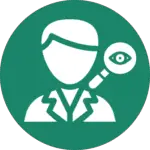What is an Optometrist?
Optometrists are pioneers in primary eye care and their objective is to assist patients and their families in taking the first step toward having healthier bodies and eyes. Doctors of optometry can assist patients in finding the best prevention strategies or the next stages in formal diagnosis and treatment if a disease or other ailment is found.
In addition to promoting eye health, optometrists offer advice to patients on how overall health may impact vision. For instance, they could advise patients on how stopping smoking or becoming in shape helps lessen eyesight issues.
Many optometrists are business owners, and those who are may devote more time to administrative tasks, including employing staff, purchasing supplies, and marketing their clinic.
Optometrists work for a variety of organizations and in a variety of venues, including hospitals, retail optical stores, and the military.
Many ophthalmologists or optometrists establish a private or group practice with one or more additional doctors of optometry. Some optometrists choose to work in research at a university or for a business. After gaining expertise, optometrists may choose to work as consultants for the ophthalmic industry, education, government, professional sports, and/or schools.
Cases
Specialties
Behavioral Optometry
Behavioral optometry is a vision care specialty that holistically treats vision problems resulting from the stress of sustained, close-range visual tasks through ocular training and special lenses. Still considered an alternative therapy option and practiced by a minority of optometrists throughout the world, behavioral optometry is a growing specialty because of its success in the treatment of migraines, depression, and panic attacks.
Geriatric Optometry
Geriatric optometry differs from the more usual form of optometric care in that the geriatric patient suffers specific and characteristic visual symptoms and problems on the one hand, and has a reduced capacity for dealing with them on the other.
Low Vision Therapy
A low-vision therapist is an optometrist or ophthalmologist who specializes in examining and diagnosing conditions that affect eyesight but cannot be corrected by conventional means like glasses or contact lenses or even surgery.
Neuro-Optometry
Neuro-optometrists assess the way the brain processes information sent by the eyes. They often work in tandem with an occupational or physical therapist to coordinate vision functions with the rest of the body. Treatment could also include work with lenses. The specialty requires a one-year clinical residency, and most practitioners are located in large, urban hospitals.
Centers & Institutes
Healthcare Delivery by Optometrists in the US
Doctors of optometry (ODs) are the major eye care specialists who practice independently. Optometrists evaluate, identify, treat, and manage diseases, injuries, and abnormalities of the visual system, the eye, and related structures. They can also diagnose underlying systemic ailments that have an impact on the eye (American Optometric Association [AOA]).
The profession has been able to increase both the scope and effectiveness of practice thanks to new technologies. The numerous advancements in medical and eye care technologies are advantageous to optometrists and their patients.
For instance, there are now more varieties of contact lenses and lens treatments than ever before. For those who require them, innovative treatments, including the use of lasers to treat glaucoma and vision problems, have improved the options available. Optometrists are usually the health care providers who talk with patients about new technologies and treatments like these.
The American Optometric Association estimates that optometrists provide 88.0 million of the 104.0 million refractive eye exams that are conducted annually by all eye care specialists. This contributes to a consistent need for industry services. Additionally, 65.0% of Americans are thought to need vision-correction products.
Are you looking for an Optometrist who will care for you? Our medical professionals at KellySearch create personalized strategies for each patient and/or their family. We have over 700k doctor listings on the website because our doctors want to give each client their undivided attention. They are also trustworthy and compassionate. Additionally, they are always available for conversation with anyone!
Sources:
The material presented above is only meant to be informative and is not intended to take the place of advice from your doctor or another health care practitioner. We advise you to talk to your provider about any questions or issues you may have.


